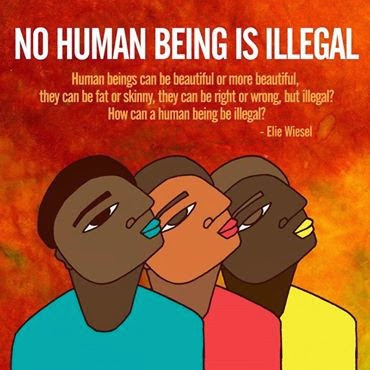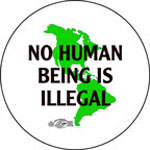
As an immigration attorney, I know the barriers immigrants face to obtain a fair trial in immigration court.
They’re huge.
However, they’re small compared to the obstacles they face to get a fair trial in the arena of public opinion.
What advocate for those from other countries has not heard the deliberate misuse of labels about immigrants?
They distort the immigration debate, and have struck a deep chord with certain segments of the American public.
The Myth Of Illegal Immigration
Over the past two decades, I’ve watched the subtle growth in efforts to mislead the American public on immigration concerns. Especially on the issue of immigrants who lack valid immigration documents.
Sadly, these efforts have struck a chord in the mind set of many citizens.
Take the term anchor babies. This label implies immigrants arrive in the country solely to give birth to children, who in turn will immigrate the parents.
Those who use such terminology overlook that it will take almost three decades for such a plot to be carried out, and it will require the parents to voluntarily leave the U.S. and seek special permission to re-enter the U.S.
Both of these preconditions greatly limit the opportunity for their hostile rhetoric to become reality.
They also ignore that if anchor babies created paths to legalization for large numbers of immigrant parents, a legislative cure could be easily constructed.
More significantly, they fail to acknowledge the correct terminology is birthright citizenship, a matter governed by the 14th amendment of the U.S. Constitution.
Moreover, it is not uncommon, nowadays, to hear citizens assert, “They’re illegals.”
Each time this term is used in my presence, I try to explain why this view is incorrect.
The status of being in the U.S. without permission is a violation of law. The individual is not illegal. As many publications like the Daily Kos have explained, “No human being is illegal.”

The difference is not minor.
To assert a person is illegal leaves no room for honest discussion about immigration reform. They must be removed or kicked-out, no questions asked.
On the other hand, to acknowledge the status of a person is unlawful leads one to the question, “What has caused this situation and how can it be fixed?”
More often than not, once this misperception is corrected, rational dialogue about our broken immigration system follows.
We may not agree on the solutions. But serious reflection is an important first step to finding answers.
Undocumented Immigrants Are
Not Criminals
Once an immigrant is termed “illegal,” the next step is easy. If an immigrant is illegal, then they must be “criminals.”
Wrong again.
Undocumented immigrants are not criminals.
Immigration law is part of our civil system of justice – not part of our criminal law system.
In fact, I know many, many undocumented immigrants who are merely one step away from obtaining lawful status.
An immigrant may be undocumented for many reasons:
- Entering the United States without permission
- Remaining in the U.S. after their visas have expired
- Waiting for their immigration applications to be reviewed
- Ignoring a judicial order to leave the country
Contrary to public opinion, none of these actions are crimes. They are civil law violations.
In short, there are no criminal penalties for these actions.
If an immigrant has violated any of these provisions, he can be apprehended and detained. He will be taken to immigration jail. In many instances, he will face immediate deportation.
Other times the government will need to start deportation and removal proceedings at immigration court. If the immigrant loses, the judge will order the individual’s deportation from the United States.
These are civil proceedings. Not criminal court hearings.
Unlike criminal defendants, immigrants facing deportation charges have no right to free counsel appointed by the court. Immigrants do not have the right to trial of a jury of their peers.
They do not even have a right to judicial review on certain types of appeals – and a lot of their supporting evidence will not be admissible at their trials.
Whereas criminal defendants have many legal protections, immigrants’ due process rights and procedural protections rights are minimal.
Immigration Lawyer As Immigration Advocate
In my view, many efforts to label undocumented immigrants as “illegal” or “criminal” immigrants are attempts to prevent serious discussions on hard legal, political, and social issues.
But you cannot resolve tough issues without honest dialogue.
If we fail to correct public misperceptions, we cannot expect genuine immigration reform.
As an immigration lawyer and advocate, it’s my duty to fight for both.
Indeed, it’s an obligation which falls on all immigrant advocates and supporters.
Is The Negative Terminology Coming To An End?
Since the original publication of this blog post, an unexpected ally for adjusting the pejorative terminology has emerged.
In a blog post written by The Center For Immigration Studies, a forceful immigrant reform opponent, it was acknowledged the the “illegal immigrant” terminology must cease.
“As someone fascinated by the complexities of both language and immigration, I think the debate over “illegal immigrant” is inevitable. But I’ve also come to see it as a distraction from the far more important discussion of immigration policy, of what we do about this problem that we struggle to name. I have come to think that if the use of a term other than illegal immigrant will help create the space for respectful dialogue by removing an irritant that has grown more powerful in recent years, it is worthwhile to suspend use of “illegal immigrant” and find an alternative. It can add a grace note to a discussion, helping to avoid acrimony. That is why I think “unauthorized” makes good sense.
I think we can take a lesson from “La Bamba”, the Mexican folk song, translated into American rock music by Richie Valens, a Mexican-American who was born 75 years ago in Pocoima, Calif. It tells us that in order to get to heaven, we need una poca de gracia — a little grace. I think that precious commodity can also be useful our national discussion of immigration and immigration policy. So while I think the term “illegal immigrant” is accurate and precise, I often use the term “unauthorized immigrant” when I am speaking with those who may see it as a sign of respect. Then I try to move on to the really hard part, reforming our national immigration policy.”
Do I believe the Center’s post will end the deliberate misuse of immigration terminology?
Not at all.
But it is a critically important concession by some of immigration reform’s toughest critics. And that’s a step in the right direction. Other opponents, though not all, will soon follow the CIS lead.
They understand that if we fail to correct public misperceptions, we cannot expect genuine immigration reform.
Both sides lose.
As an immigration lawyer and advocate, it’s my duty to fight for both.
Indeed, it’s an obligation which falls on all immigrant advocates and supporters.
By Carlos Batara, Immigration Law, Policy, And Politics




